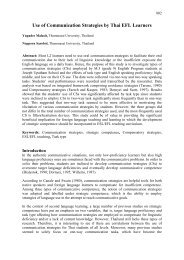The Effects of Semantic Mapping on Vocabulary Memorizing
The Effects of Semantic Mapping on Vocabulary Memorizing
The Effects of Semantic Mapping on Vocabulary Memorizing
You also want an ePaper? Increase the reach of your titles
YUMPU automatically turns print PDFs into web optimized ePapers that Google loves.
In research menti<strong>on</strong>ed above, there are c<strong>on</strong>trasting points <str<strong>on</strong>g>of</str<strong>on</strong>g> view. Most <str<strong>on</strong>g>of</str<strong>on</strong>g> the research atIt is<br />
noticeable that more studies need to be c<strong>on</strong>ducted to test the semantic mapping’s effectiveness<br />
<strong>on</strong> high school students who are at pre-intermediate level <str<strong>on</strong>g>of</str<strong>on</strong>g> English pr<str<strong>on</strong>g>of</str<strong>on</strong>g>iciency. Besides, there<br />
was not yet any empirical study <strong>on</strong> the use <str<strong>on</strong>g>of</str<strong>on</strong>g> semantic mapping in vocabulary teaching and<br />
learning in the researcher’s c<strong>on</strong>text. For this reas<strong>on</strong>, the researcher c<strong>on</strong>ducted this study to gain<br />
more insights into the addressed matter in her c<strong>on</strong>text.<br />
6. Summary <str<strong>on</strong>g>of</str<strong>on</strong>g> the literature<br />
This secti<strong>on</strong> summarizes the literature related to vocabulary learning and teaching, word<br />
meaning memorizing and semantic mapping for vocabulary teaching. Some previous related<br />
studies are also presented. <str<strong>on</strong>g>The</str<strong>on</strong>g>se studies have shown that semantic mapping is a useful<br />
vocabulary teaching technique which helps to memorize and recall word meanings better.<br />
Findings from the above studies reveal some aspects <str<strong>on</strong>g>of</str<strong>on</strong>g> research values influencing and guiding<br />
the implementati<strong>on</strong> <str<strong>on</strong>g>of</str<strong>on</strong>g> the present study. In this study, the researcher hypothesizes that (1)<br />
students would memorize and recall vocabulary easily and effectively by using semantic<br />
mapping technique; (2) students would have positive attitudes towards semantic mapping<br />
technique.<br />
Methodology<br />
1. Research questi<strong>on</strong>s and hypotheses<br />
1. Research questi<strong>on</strong>s<br />
In order to investigate the effects <str<strong>on</strong>g>of</str<strong>on</strong>g> semantic mapping <strong>on</strong> vocabulary memorizing, the researcher<br />
attempted to find out the answers for the following questi<strong>on</strong>s:<br />
1. Does semantic mapping help the students memorize word meanings effectively?<br />
2. What are the students’ attitudes towards the semantic mapping technique?<br />
2. Hypotheses<br />
Based <strong>on</strong> the relevant literature, it was hypothesized that semantic mapping would have a<br />
positive effect <strong>on</strong> students’ vocabulary retenti<strong>on</strong>. Besides, the researcher also expected that the<br />
participants would have positive attitudes towards the use <str<strong>on</strong>g>of</str<strong>on</strong>g> semantic mapping in vocabulary<br />
memorizing.<br />
2. Research design<br />
<str<strong>on</strong>g>The</str<strong>on</strong>g> research was an experiment with a two-group pre-test and post-test design. In the research,<br />
class 11CB1 was randomly assigned as the experimental group and class 11CB2 as the c<strong>on</strong>trol<br />
group. Before and after the experiment, both groups were given the selective test, the pre-test and<br />
the post-test <str<strong>on</strong>g>of</str<strong>on</strong>g> vocabulary knowledge. During the experiment, the implementati<strong>on</strong> <str<strong>on</strong>g>of</str<strong>on</strong>g> semantic<br />
mapping technique was m<strong>on</strong>itored to help the experimental group memorize word meanings<br />
whereas the word lists, as a traditi<strong>on</strong>al way <str<strong>on</strong>g>of</str<strong>on</strong>g> teaching vocabulary, was taught to the c<strong>on</strong>trol<br />
group. In additi<strong>on</strong>, before and after the experiment, a questi<strong>on</strong>naire was carried out to measure<br />
the two groups’ attitude towards semantic mapping at the two points <str<strong>on</strong>g>of</str<strong>on</strong>g> measurement. Besides,<br />
an interview was c<strong>on</strong>ducted to nine students in the experimental group so that the researcher<br />
could get more in-depth informati<strong>on</strong> <str<strong>on</strong>g>of</str<strong>on</strong>g> the students’ percepti<strong>on</strong>s <str<strong>on</strong>g>of</str<strong>on</strong>g> the implementati<strong>on</strong> <str<strong>on</strong>g>of</str<strong>on</strong>g><br />
semantic mapping technique.<br />
639






